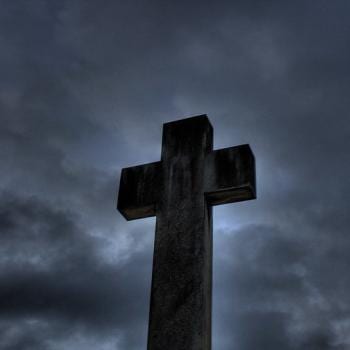
Then war broke out in heaven. Michael and his angels fought against the dragon, and the dragon and his angels fought back. But he was not strong enough, and they lost their place in heaven. The great dragon was hurled down—that ancient serpent called the devil, or Satan, who leads the whole world astray. He was hurled to the earth, and his angels with him. Rev 12: 17 – 18
This is day 4 of the Novena to St Michael. We are praying for our persecuted Christian brothers and sisters around the world.
Our Lord was crucified by a group of corrupt priests and a cowardly politician. Today, let’s meditate on the cowardly politician.
Pontius Pilate was not a coward in what we normally consider the manly sense. He was a soldier, and I would imagine a brave one. He certainly had no fear of putting people — even innocent ones — to death. Not too long before he was faced with the early-morning trial of this carpenter turned itinerate miracle worker and preacher from Nazareth, he had ordered the slaughter of worshipers in the Temple, “mingling their blood with their sacrifices.”
Only God knew how many people Pilate had killed. I’m sure that Pilate had lost count long before he was forced to deal with the demands of the corrupt priests that he put yet another man to death. He knew the priests were corrupt because he was their corruptor. Rome left the Levitical priesthood in place when they conquered this land, but they did what governments always try to do: They tamed this priesthood with money and special favors; with the power of speaking for the larger populace to the ruling powers.
The uneasy population underneath this layer of Roman-Levitical governance gave the priests a certain power in dealing with Pilate. If Pilate had been an absolute ruler, or if Judea had been an unimportant area, this wouldn’t have been true.
But Pilate merely governed in the name of the Emperor in Rome. His head was as easily forfeit as that of any of the people he governed. Judea, for all its backward ways, was an important piece of real estate. It sat strategically along the trade routes between Rome and the breadbaskets of Egypt and the East. War here hurt commerce everywhere. And Rome, like all empires, cared far more for commerce than human life, including the life of its governors.
Pilate’s job was to keep things peaceable and those trade routes running. Uprisings and military clashes cost Rome money and endangered its privileged way of life. They weren’t to be tolerated.
The priest’s job in all this was to work with Pilate to keep the people down. Which meant that they had Pilate by the throat. Pilate, on the other hand, could certainly squeeze and punish them harshly if they cost him too much trouble, which meant he had them by the throat, also.
So, it was a gathering of political friends and allies that morning, come to haggle over what should have been a small thing to this Roman governor: The death of a single man.
But there must have been something in Pilate, some honest thing or longing that only God saw. Because He dealt differently with Pilate than He did Herod, or even the priests.
He warned Pilate with a dream to his wife. Have nothing to do with that innocent man, she told her husband. For I have suffered greatly because of him in a dream last night.
Jesus talked to Pilate, answering Him as directly as He ever did anyone. My kingdom is not of this world … I come to testify to the truth.
Pilate responded with the answer of nihilists from then to now: What is truth?
And yet, he tried. He tried hard to comply with his wife’s warning and what sounds like a cacophony of inner warnings in his own mind and step aside from killing this one man. He sent Jesus to Herod and tried to pass the problem off on him. He had Jesus scourged and displayed His wrecked and bleeding person to the priests with the words See the man!
See how I have punished Him for you, he implies. See the blood and brokenness of Him. See the man! Isn’t this enough for you?
He even tried to use their own religious laws to free Jesus because of the Passover.
But nothing worked, because they wouldn’t have it. And in the end, Pilate literally washed his hands of the whole affair declaiming that the blood of this man is on you to the priests and ordering Jesus murdered by means of crucifixion.
It is fascinating that even though Jesus came for the purpose of redeeming all of humanity on Calvary, God still gave Pontius Pilate every opportunity to avoid his participation in this great crime. The point here is that God does not entrap us into sin, even if our sin plays a part in the on-going history of His Kingdom.
We choose.
The cowardly politician and the corrupt priests who murdered Our Lord did not have to know that they were dealing with God Incarnate to see that what they were doing was wrong. Their own laws told them that. The innate natural law that is inborn in each of us told them that.
You do not murder innocent people. Killing people to preserve your political career or your place in society or your special privileges is wrong. There is no qualifier to the wrongness of it.
But the priests convinced themselves, as people do, that what they were doing was a political necessity to “save” the nation, and Pilate convinced himself that by killing this man he could avoid the uprising that might get him recalled. They convinced themselves and that is the key. It is the key to their evil that day and to most of ours today.
We can convince ourselves of anything.
That is what is at work in the political and religious justifications for the violent persecution of Christians around the world today. And for these persecutors now, just as it was for Our Lord’s murderers 2,000 years ago, there is no qualifier to the evil wrongness of what they are doing.
The innate, inborn natural law that tells us every one that the murder of innocents is wrong condemns every person on this earth who breaks it. There is no confabulation or dissimulation or propaganda that we can use to convince ourselves otherwise that will wash away the stain of blood guilt for those who kill innocent people.
Those who kill Christians because they are Christians commit the almost unfathomable sin of crucifying Christ again in the persons of His followers.
Without repentance and the grief that comes with the realization that they have done monstrous things, they are doomed.
When we pray for our persecuted brothers and sisters in Christ, we need also to pray for their persecutors.
For while those who are privileged to suffer for Christ are piling up crowns for themselves in heaven, their persecutors are committing sins, that, if they die with them on their souls, will condemn them to an eternity in hell.
Here is the Novena to St Michael for the Persecuted Church, Day 4. Please pray it and ask others to join you.
Glorious Saint Michael, guardian and defender of the Church of Jesus Christ, come to the assistance of His followers, against whom the powers of hell are unchained. Guard with special care our Holy Father, the Pope, and our bishops, priests, all our religious and lay people, and especially the children. Saint Michael, watch over us during life, defend us against the assaults of the demon, and assist us especially at the hour of death. Help us achieve the happiness of beholding God face to face for all eternity. Amen. Saint Michael, intercede for me with God in all my necessities, especially for the conversion of the world,that from pole to pole,dateline to dateline,all will call out Jesus' name. Obtain for me a favourable outcome in the matter I recommend to you. Mighty prince of the heavenly host, and victor over rebellious spirits, remember me for I am weak and sinful and so prone to pride and ambition. Be for me, I pray, my powerful aid in temptation and difficulty, and above all do not forsake me in my last struggle with the powers of evil. Amen.
Novena for the Persecuted Church, Day 3
Novena for the Persecuted Church, Day 2
Novena for the Persecuted Church, Day 1












